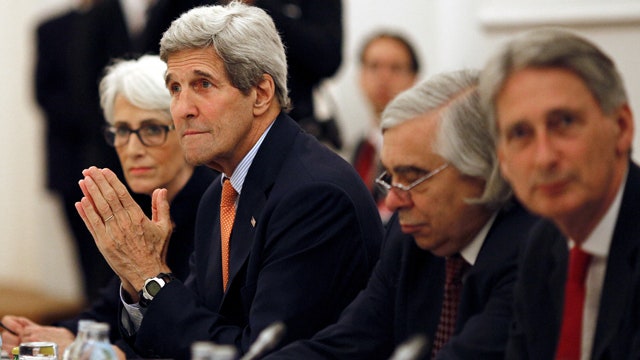Nuclear talks extended; Iran makes demands
Fox Patriot Report: Fox correspondent Lea Gabrielle reports on the latest national security issues.
International negotiators have extended their deadline once again as they struggle to reach a nuclear deal with Iran.
Negotiators had been running up against a Tuesday deadline, after initially extending a June 30 deadline amid lingering differences. On Tuesday morning, the State Department said the new deadline is now Friday, as talks continue.
"We've made substantial progress in every area, but this work is highly technical and high stakes for all of the countries involved," State Department official Marie Harf said in a statement. "We're frankly more concerned about the quality of the deal than we are about the clock, though we also know that difficult decisions won't get any easier with time -- that is why we are continuing to negotiate."
She said they're taking the talks "day to day" in pursuit of a comprehensive agreement, and Secretary of State John Kerry will remain in Vienna for discussions.
"To allow for the additional time to negotiate, we are taking the necessary technical steps for the measures of the Joint [Plan] of Action to remain in place through July 10," Harf said, referring to a prior interim agreement.
The extension raises questions about whether world powers can resolve their differences and strike a deal to cut off Iranian pathways to a bomb. President Obama earlier warned that the U.S. could walk away if they're in danger of seeing a bad deal.
Republican lawmakers have long warned that's the direction talks are heading. Senate Majority Leader Mitch McConnell, R-Ky., recently urged all sides to hit pause on the discussions and reassess their goals.
The extension of talks poses a potential complication for Kerry and his team. Under congressional legislation passed earlier this year, if a deal is submitted after July 9, Congress can claim 60 days to review and vote on the agreement. If a deal is submitted before then, the time frame is only 30 days.
Missing that deadline could leave any deal in limbo until September, while Congress reviews it.
It was becoming evident by early Tuesday that talks would press on. Fox News learned that the hotel rooms arranged for the reporters in Vienna with Kerry had been extended through Saturday, July 11.
Meanwhile, Iran threw another wrinkle into the mix on Monday by pushing for an end to the U.N. arms embargo on the country -- a parallel deal that the United States opposes as it seeks to limit Tehran's Mideast power and influence.
Lifting the arms embargo would be separate from a long-term accord that foresees limits on Iran's nuclear programs in exchange for relief from crippling economic sanctions on the Islamic Republic. But Iran also sees existing U.N. resolutions affecting Iran's nuclear program and the accompanying sanctions as unjust and illegal. It has insisted that those resolutions be lifted since the start of international negotiations nearly a decade ago to limit its nuclear-arms making capability.
After world powers and Iran reached a framework pact in April, the U.S. said "important restrictions on conventional arms and ballistic missiles" would be incorporated in any new U.N. guidelines for Iran. It also said "a new U.N. Security Council resolution ... will endorse" any deal.
Russia and China have expressed support for lifting the embargo, which was imposed in 2007 as part of a series of penalties over Iran's nuclear program.
But the U.S. doesn't want the arms ban ended because it could allow Tehran to expand its military assistance for Syrian President Bashar Assad's embattled government, for the Houthi rebels in Yemen and for Hezbollah in Lebanon. It also would increase already strong opposition to the deal in Congress and in Israel.
Over the weekend, diplomats reported tentative agreement on the speed and scope of sanctions relief for Iran in the potential nuclear accord, even as issues such as inspection guidelines and limits on Iran's nuclear research and development remained contentious.
Fox News' James Rosen and Wes Barrett and The Associated Press contributed to this report.













































